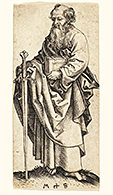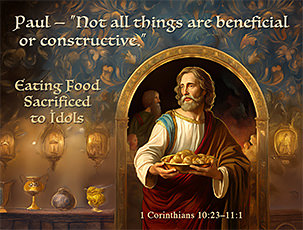First Corinthians 10:23–11:1 . . .
The Believer’s Freedom
Today’s passage could well be titled “Sacrifice for others or you’ll dishonor God.” Apostle Paul discusses how we should interact with others over issues of freedom, advising each of us to be willing to relinquish our “rights” for the sake of our brothers and sisters. In 10:23 (shown at the bottom of the page), Paul shares an important principle: Edification is more important than our personal gratification. He writes, “I have the right to do anything," you say — but not everything is beneficial. "I have the right to do anything" — but not everything is constructive.” As Christians, we really do have essential freedom in matters of morally neutral things; however, our behavior must be tempered with concern for those who are in the body of Christ.
That word "edify" means to build up or strengthen. Paul uses it in his letters to describe the strengthening of Christian character in ourselves and other people.
Our apostle gives us a second encouraging principle in v. 24. Our freedom ought to express itself in serving other people. With his “No one should seek their own good, but the good of others,” Paul is perhaps suggesting that our thoughts should always be directed to other brothers and sisters in Christ and that we should eagerly make sacrifices for others. In vv. 25–27, he tells us that liberty in Christ will always trump legalism, writing, “Eat anything sold in the meat market without raising questions of conscience, for, ‘The earth is the Lord’s, and everything in it.’” In three verses, Paul focuses on our freedom in Christ. He says it doesn’t matter what we eat, including food offered to idols, because neither the eating of it nor the abstaining from it will have any effect on our relationship with God. All food is a gift from God. So Paul says, in effect, “Enjoy life; don’t be overly strict.”
Next, Paul informs the Corinthians that they shouldn’t make an issue of the origin of the meat or food they’re given; they should freely eat all of it. Paul implies that living out this freedom means [for them and us] that we’re going to have appetizing opportunities to show others what we believers are all about; we’ll become “an evangelistic entrée into people’s lives.” After all, nonbelievers often invite us into their homes, giving us complete freedom to eat with them, whatever they put before us. Paul’s solution to a potential violation of conscience is “Don’t ask questions!” If we become legalistic, uptight, self-righteous, “holier than thou” types, our non-Christian acquaintances won’t want anything to do with us. Otherwise, when we demonstrate a life of freedom and openness to non-believers; our behavior and attitude will likely attract them to Jesus.
In vv. 28–30, Paul raises another challenging scenario. What he’s doing in vv. 28–29a is raising a hypothetical situation in which you’ve been invited to a non-Christian friend’s home, and one of your Christian friends who has a weaker conscience is also there and becomes offended or confused by your freedom. Paul suggests that we might decide to refrain from “eating the meat” so as not to risk leading that less-mature brother or sister in Christ into sin or confusing their conscience. But Paul makes clear that even though we may choose to modify our actions for the good of the weaker brother or sister, we’re not to adjust our own conscience. Then, in v. 29b, Paul again defends his freedom to eat any kind of food, especially food that he knows is a good gift from God, and receive it with gratitude. He also says he refuses to be fearful about what other people think of him; he’s not going to be controlled by that.
Apostle Paul leaves us with this general principle: Believers should do everything “for the glory of God,” which means to reflect God’s glory in the way we live. Verses 31–32 exemplify the purpose of our freedom in Christ. Paul’s desire was to live out his freedom in Christ, partly because of its evangelistic potential for the sake of the non-Jewish Gentiles and the Jews who didn’t yet know Christ. We, too, should prioritize our having “an attractively inoffensive lifestyle of freedom.”
Paul closes this passage with an unsettling invitation in his last two verses. After you read them, you might ask yourself, Could I issue the same invitation that Paul does? He says that his own life represents a pattern of freedom in Jesus Christ. He thereby invites other people to imitate him.
Paul is asking every one of us through this entire passage these four questions.
1. Do you want to know what it means to live a consistent Christian life?
2. Do you want to properly balance freedom and restraint?
3. Do you want to be in the world and not of the world?
4. Do you want to have a positive spiritual influence in your community but not allow that community to mold you so that you compromise what’s true and right?
He adds, in effect: “If you do, then watch me, follow me, live with me. I’m certainly not perfect, but I try to imitate the selfless life that Christ lived. I want to glorify God in the personal story I tell people while glorifying him in what I do and in my heart’s attitudes. To the extent that I succeed at all these endeavors, then the good news is that you can, too.”
Note: 1st Corinthians challenges believers to examine every aspect of their lives through the lens of the Gospel. In chapters 8–10, Paul presents these three challenges:
Food offered to idols (ch. 8) | Surrendering his rights (ch. 9) | Warning against idolatry (ch. 10)
› Watch BibleProject’s superb animated video (2 min.) highlighting Paul’s messages in these three chapters.
† Summary of 1 Corinthians 10:23–11:1
In this passage, Paul addresses the issue of Christian freedom and responsibility, particularly in the context of eating food sacrificed to idols. Here’s a summary of its key points:
• Christian Freedom and Its Limits
Paul begins by addressing a Corinthian slogan, “All things are lawful,” but qualifies it by stating that not all things are beneficial or constructive. This establishes the principle that Christian freedom should be exercised with wisdom and consideration for others.
• Seeking the Good of Others
In addition, Paul emphasizes that believers shouldn’t seek their own good, but the good of others. This principle guides his advice throughout the passage.
• Eating Food Sacrificed to Idols
Regarding food sold in the marketplace, Paul advises in vv. 25–28:
† Eat food without raising questions of conscience.
† If someone informs you that the food was sacrificed to idols, refrain from eating it for the sake of the one who told you.
• The Reason for Abstaining
Paul clarifies that one abstains not because the food is tainted, but out of consideration for the conscience of others (vv. 28–29). He stresses that our freedom shouldn’t become a stumbling block to those with weaker consciences.
• Glorifying God in All Things
The passage concludes with the overarching principle of glorifying God in everything we do (v. 31), including eating and drinking. Paul encourages believers to avoid offending Jews, Greeks, or the church of God, and to seek the good of many so that they may be saved.
• Paul’s Example
In 11:1, Paul exhorts the Corinthians to imitate him as he imitates Christ. This serves as a practical application of the principles he’s outlined, demonstrating how to balance freedom and responsibility in Christian living.
This passage documents Paul’s approach to balancing Christian freedom with responsibility towards others, emphasizing love and consideration as guiding principles for behavior in the context of a diverse community of believers.
- Q. 1 Are there any activities that you are biblically free to participate in that you may need to relinquish for the sake of your Christian brothers and sisters (vv. 23–24)? If so, do you love the body of Christ enough to surrender your rights?
- Q. 2 To what degree does your life glorify God in all that you do (v. 31)? What one area of your life tarnishes God’s reputation and pleasure? Who can help you submit yourself to the Lord and to others?
- Q. 3 Would you want people to imitate how you live (11:1)? Why or why not?
1 Corinthians 10:23–11:1
New International Version (NIV)
[You can view it in a different version by clicking here; you can also listen to this chapter.]
The Believer’s Freedom
23"I have the right to do anything," you say — but not everything is beneficial. "I have the right to do anything" — but not everything is constructive. 24No one should seek their own good, but the good of others.
25Eat anything sold in the meat market without raising questions of conscience, 26for, "The earth is the Lord's, and everything in it."
27If an unbeliever invites you to a meal and you want to go, eat whatever is put before you without raising questions of conscience. 28But if someone says to you, "This has been offered in sacrifice," then do not eat it, both for the sake of the one who told you and for the sake of conscience. 29I am referring to the other person’s conscience, not yours. For why is my freedom being judged by another’s conscience? 30If I take part in the meal with thankfulness, why am I denounced because of something I thank God for?
31So whether you eat or drink or whatever you do, do it all for the glory of God. 32Do not cause anyone to stumble, whether Jews, Greeks or the church of God — 33even as I try to please everyone in every way. For I am not seeking my own good but the good of many, so that they may be saved. 11 1Follow my example, as I follow the example of Christ.

